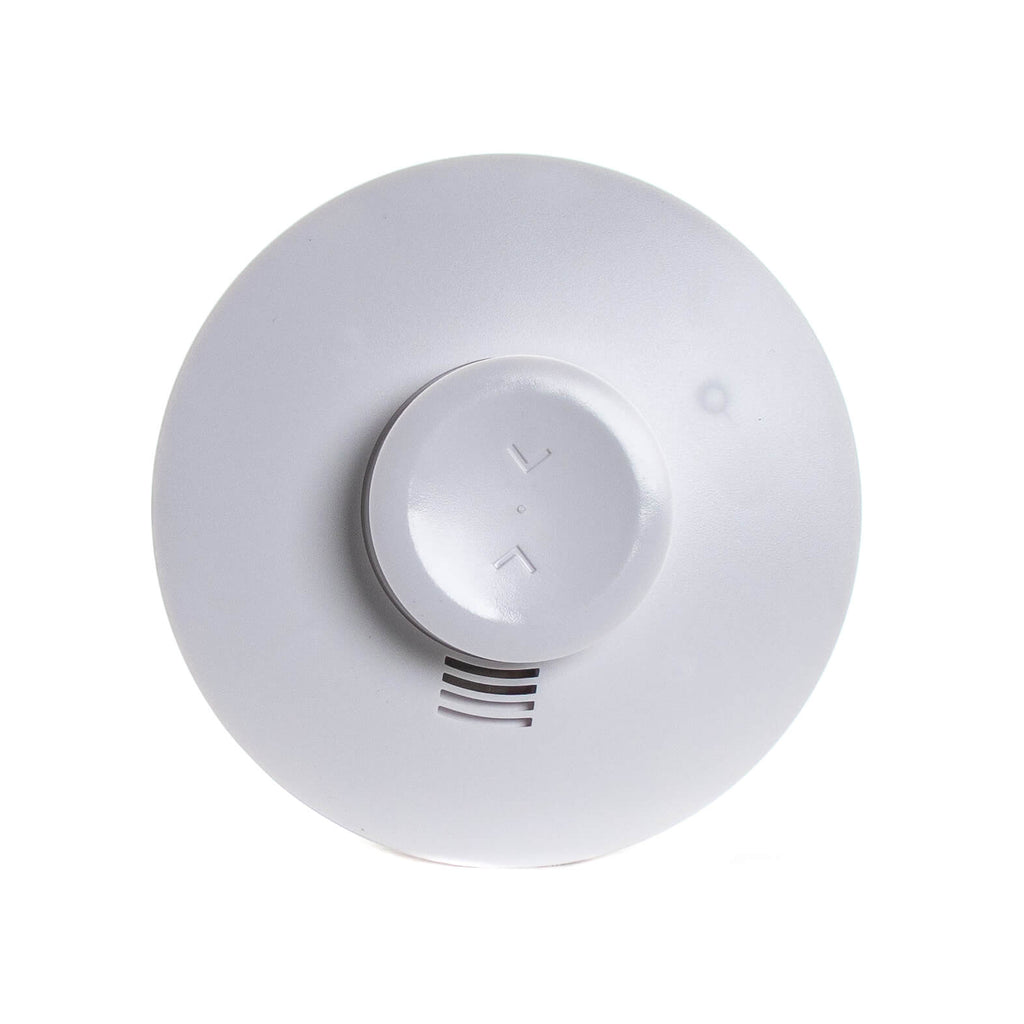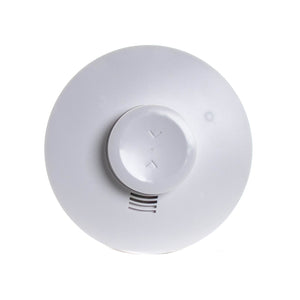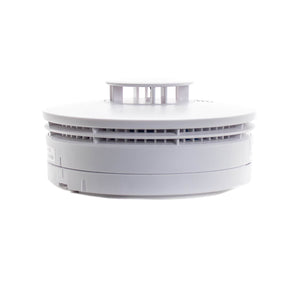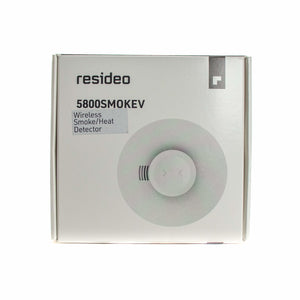
Honeywell Resideo 5800SMOKEV Wireless Smoke / Heat Detector
The cream of the crop when it comes to wireless Honeywell/Resideo smoke detectors the 5800SMOKEV has a total of 4 sensors built into one device. The 5800SMOKEV features a photoelectric smoke detector, a max temperature heat detector, a rate-of-rise high-temperature sensor, and to top it all off a low-temperature alert sensor. Along with all of those sensors, there is also an 85db sounder built into the device to help you pinpoint which sensor went off when tripped. The 5800SMOKEV, as stated in the name, works with any alarm system that supports Honeywell/Resideo 5800 wireless devices.
The average battery life for the 5800SMOKEV under typical use is 5 years, and the 3V CR123A batteries are easily replaced when battery life is low. Low battery life and sensor alerts are easily visible by looking at the status LEDs on the device, and the sensor is easily tested using the test button on the device. The 5800SMOKEV also has a maintenance sensor inside of the smoke to let you know when the device needs to be cleaned or serviced, helping you avoid false alarms and potential non-triggers.
SPECS:
Fixed Temp Heat Detection: 135°F (57°C)
Rate-Of-Rise Detection: > 104 °F @ 15 °F/min (40 °C @ 8.33 °C/min)
Low Temp Alert: 41 °F (5 °C)
RF Supervision: 60 to 70 Mins
RF Frequency: 345MHz
Install Location: Indoor only
Sounder Output: 85 db @ 10ft
Power Source: 3V, CR123A x2
Battery Life: 5 years
Max Spacing: 50ft x 50ft max
Dimensions: 4.74 in x 2.31 in (120 mm x 59 mm)
QUESTIONS & ANSWERS
Ask a Question-
does this replace the ademco 5808?
Yes, this is the replacement for the previous 5808 model.
-
How often does the smoke alarm ping the control unit to establish continuity in service and to validate that the smoke alarm is functioning correctly?
The manuals do not specifically give the time constraints to my knowledge, but most panels check in at least once a day, and some check in multiple times per day. During that ping if there is a loss in connection you'll get a trouble for the zone. If the sensor ever detects an issue with its ability to sense smoke or has a low battery it will immediately alert the panel and indicate with an LED that it needs serviced.
Related Products
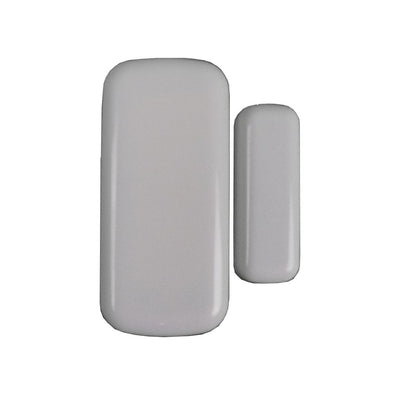
-
{"id":7037359749,"title":"Honeywell 5800mini Wireless Door - Window Sensor","handle":"honeywell-5800mini-wireless-door-window-sensor","description":"\u003ch2\u003eHoneywell 5800mini Wireless Door - Window Sensor\u003c\/h2\u003e\n\u003cbr\u003e\n\u003cp\u003eThe Honeywell 5800mini is a compact door\/window transmitter that can be used with the \u003ca href=\"https:\/\/www.alarmsystemstore.com\/collections\/qolsys-iq-panel-4\" title=\"Lynx Plus L3000\" target=\"_blank\" rel=\"noopener noreferrer\"\u003eLynx Plus L3000\u003c\/a\u003e, \u003ca href=\"https:\/\/www.alarmsystemstore.com\/collections\/qolsys-iq-panel-4\" title=\"Lynx Touch L5210\" target=\"_blank\" rel=\"noopener noreferrer\"\u003eLynx Touch L5210\u003c\/a\u003e, \u003ca href=\"https:\/\/www.alarmsystemstore.com\/collections\/qolsys-iq-panel-4\" title=\"Lynx Touch L7000\" target=\"_blank\" rel=\"noopener noreferrer\"\u003eLynx Touch L7000\u003c\/a\u003e or the \u003ca href=\"https:\/\/www.alarmsystemstore.com\/products\/ademco-vista-15p\" title=\"Honeywell Vista 15P\" target=\"_blank\" rel=\"noopener noreferrer\"\u003eHoneywell Vista 15P\u003c\/a\u003e and \u003ca href=\"https:\/\/www.alarmsystemstore.com\/collections\/ademco-honeywell-vista-20p-kits\" title=\"Honeywell Vista 20P\" target=\"_blank\" rel=\"noopener noreferrer\"\u003eHoneywell Vista 20P\u003c\/a\u003e that have an attached wireless receiver. These have built-in signal transmission and low-battery LEDs so that you can see when it's working and when you need to change the batteries out.\u003c\/p\u003e\n\u003cp\u003eThe transmitter measures in at a miniscule 1\" W x 2.2\" H x 0.25\" D and the magnet measures 0.25\" x 0.25\" x 1\". These make for an excellent choice for those who have installations where a bulkier contact would be too much. These are powered by a \u003ca href=\"https:\/\/www.alarmsystemstore.com\/products\/cr123-lithium-3-volt-battery\" title=\"CR123 3 volt lithium battery\" target=\"_blank\" rel=\"noopener noreferrer\"\u003eCR123 3 volt lithium battery\u003c\/a\u003e and the batteries have a 2 to 3 year life expectancy before you have to change them. The 5800mini transmitters run on the 345 MHz frequency just as the rest of the \u003ca href=\"https:\/\/www.alarmsystemstore.com\/collections\/honeywell-security-wireless-sensors\" title=\"Honeywell 5800 series wireless devices\" target=\"_blank\" rel=\"noopener noreferrer\"\u003eHoneywell 5800 series wireless devices\u003c\/a\u003e do. The LEDs of this device have different meanings. The blue LED helps to ensure proper magnet placement. The green LED means that the transmitter is transmitting. The red LED lets you know that the battery is getting low and needs to be changed.\u003c\/p\u003e\n\u003cp\u003eThe Honeywell wireless devices, on average, get you a 200' radius for placement and if you need a wider area or a stronger signal then you can add the \u003ca href=\"https:\/\/www.alarmsystemstore.com\/products\/ademco-5800rp-rf-wireless-repeater-module\" title=\"Honeywell 5800RP Repeater\" target=\"_blank\" rel=\"noopener noreferrer\"\u003eHoneywell 5800RP Repeater\u003c\/a\u003e to the system to push this even further. Honeywell wireless devices are superb if you have to install other sensors and you don't have the ability to run wire. They make a wide range of devices for burglary detection including \u003ca href=\"https:\/\/www.alarmsystemstore.com\/collections\/honeywell-wireless-door-window-sensors\" title=\"door\/window contacts\" target=\"_blank\" rel=\"noopener noreferrer\"\u003edoor\/window contacts\u003c\/a\u003e, \u003ca href=\"https:\/\/www.alarmsystemstore.com\/collections\/honeywell-wireless-motion-glassbreak-fire-sensors\" title=\"motions and glassbreaks\" target=\"_blank\" rel=\"noopener noreferrer\"\u003emotions and glassbreaks\u003c\/a\u003e and \u003ca href=\"https:\/\/andybowman.myshopify.com\/collections\/honeywell-wireless-keypads-remotes\" title=\"wireless keypads and remotes\" target=\"_blank\" rel=\"noopener noreferrer\"\u003ewireless keypads and remotes\u003c\/a\u003e. Not only do they provide wireless burglary detection, but you can get devices that can be used to monitor environmental conditions such as fire, flooding and temperature.\u003c\/p\u003e\n\u003cp\u003e\u003ca href=\"https:\/\/cdn.shopify.com\/s\/files\/1\/1659\/9809\/files\/5800Mini-Installation-Instructions.pdf?9830303019243719310\" target=\"_blank\" title=\"5800MINI Installation manual\" rel=\"noopener noreferrer\"\u003e5800MINI Installation manual\u003cbr\u003e\u003c\/a\u003e\u003ca href=\"https:\/\/cdn.shopify.com\/s\/files\/1\/1659\/9809\/files\/5800MINI-Data-Sheet.PDF?9830303019243719310\" target=\"_blank\" title=\"5800MINI Data sheet\" rel=\"noopener noreferrer\"\u003e5800MINI Data sheet\u003c\/a\u003e\u003c\/p\u003e","published_at":"2016-12-09T03:05:00-05:00","created_at":"2017-01-23T07:16:47-05:00","vendor":"Honeywell","type":"Honeywell Security Wireless","tags":["5800 mini","5800MINI","Honeywell Security","Honeywell Security Wireless"],"price":3725,"price_min":3725,"price_max":3725,"available":true,"price_varies":false,"compare_at_price":null,"compare_at_price_min":0,"compare_at_price_max":0,"compare_at_price_varies":false,"variants":[{"id":24526467589,"title":"Default Title","option1":"Default Title","option2":null,"option3":null,"sku":"Hon-5800mini","requires_shipping":true,"taxable":true,"featured_image":null,"available":true,"name":"Honeywell 5800mini Wireless Door - Window Sensor","public_title":null,"options":["Default Title"],"price":3725,"weight":113,"compare_at_price":null,"inventory_quantity":5,"inventory_management":"shopify","inventory_policy":"continue","barcode":"Hon-5800mini","requires_selling_plan":false,"selling_plan_allocations":[]}],"images":["\/\/www.alarmsystemstore.com\/cdn\/shop\/products\/honeywell-5800mini-wireless-door-window-sensor-409099.jpg?v=1595526206","\/\/www.alarmsystemstore.com\/cdn\/shop\/products\/honeywell-5800mini-wireless-door-window-sensor-700959.jpg?v=1595526206"],"featured_image":"\/\/www.alarmsystemstore.com\/cdn\/shop\/products\/honeywell-5800mini-wireless-door-window-sensor-409099.jpg?v=1595526206","options":["Title"],"media":[{"alt":"Honeywell 5800mini Wireless Door - Window Sensor - AlarmSystemStore.com","id":7363145236582,"position":1,"preview_image":{"aspect_ratio":1.0,"height":1024,"width":1024,"src":"\/\/www.alarmsystemstore.com\/cdn\/shop\/products\/honeywell-5800mini-wireless-door-window-sensor-409099.jpg?v=1595526206"},"aspect_ratio":1.0,"height":1024,"media_type":"image","src":"\/\/www.alarmsystemstore.com\/cdn\/shop\/products\/honeywell-5800mini-wireless-door-window-sensor-409099.jpg?v=1595526206","width":1024},{"alt":"Honeywell 5800mini Wireless Door - Window Sensor - AlarmSystemStore.com","id":7363145302118,"position":2,"preview_image":{"aspect_ratio":1.0,"height":1024,"width":1024,"src":"\/\/www.alarmsystemstore.com\/cdn\/shop\/products\/honeywell-5800mini-wireless-door-window-sensor-700959.jpg?v=1595526206"},"aspect_ratio":1.0,"height":1024,"media_type":"image","src":"\/\/www.alarmsystemstore.com\/cdn\/shop\/products\/honeywell-5800mini-wireless-door-window-sensor-700959.jpg?v=1595526206","width":1024}],"requires_selling_plan":false,"selling_plan_groups":[],"content":"\u003ch2\u003eHoneywell 5800mini Wireless Door - Window Sensor\u003c\/h2\u003e\n\u003cbr\u003e\n\u003cp\u003eThe Honeywell 5800mini is a compact door\/window transmitter that can be used with the \u003ca href=\"https:\/\/www.alarmsystemstore.com\/collections\/qolsys-iq-panel-4\" title=\"Lynx Plus L3000\" target=\"_blank\" rel=\"noopener noreferrer\"\u003eLynx Plus L3000\u003c\/a\u003e, \u003ca href=\"https:\/\/www.alarmsystemstore.com\/collections\/qolsys-iq-panel-4\" title=\"Lynx Touch L5210\" target=\"_blank\" rel=\"noopener noreferrer\"\u003eLynx Touch L5210\u003c\/a\u003e, \u003ca href=\"https:\/\/www.alarmsystemstore.com\/collections\/qolsys-iq-panel-4\" title=\"Lynx Touch L7000\" target=\"_blank\" rel=\"noopener noreferrer\"\u003eLynx Touch L7000\u003c\/a\u003e or the \u003ca href=\"https:\/\/www.alarmsystemstore.com\/products\/ademco-vista-15p\" title=\"Honeywell Vista 15P\" target=\"_blank\" rel=\"noopener noreferrer\"\u003eHoneywell Vista 15P\u003c\/a\u003e and \u003ca href=\"https:\/\/www.alarmsystemstore.com\/collections\/ademco-honeywell-vista-20p-kits\" title=\"Honeywell Vista 20P\" target=\"_blank\" rel=\"noopener noreferrer\"\u003eHoneywell Vista 20P\u003c\/a\u003e that have an attached wireless receiver. These have built-in signal transmission and low-battery LEDs so that you can see when it's working and when you need to change the batteries out.\u003c\/p\u003e\n\u003cp\u003eThe transmitter measures in at a miniscule 1\" W x 2.2\" H x 0.25\" D and the magnet measures 0.25\" x 0.25\" x 1\". These make for an excellent choice for those who have installations where a bulkier contact would be too much. These are powered by a \u003ca href=\"https:\/\/www.alarmsystemstore.com\/products\/cr123-lithium-3-volt-battery\" title=\"CR123 3 volt lithium battery\" target=\"_blank\" rel=\"noopener noreferrer\"\u003eCR123 3 volt lithium battery\u003c\/a\u003e and the batteries have a 2 to 3 year life expectancy before you have to change them. The 5800mini transmitters run on the 345 MHz frequency just as the rest of the \u003ca href=\"https:\/\/www.alarmsystemstore.com\/collections\/honeywell-security-wireless-sensors\" title=\"Honeywell 5800 series wireless devices\" target=\"_blank\" rel=\"noopener noreferrer\"\u003eHoneywell 5800 series wireless devices\u003c\/a\u003e do. The LEDs of this device have different meanings. The blue LED helps to ensure proper magnet placement. The green LED means that the transmitter is transmitting. The red LED lets you know that the battery is getting low and needs to be changed.\u003c\/p\u003e\n\u003cp\u003eThe Honeywell wireless devices, on average, get you a 200' radius for placement and if you need a wider area or a stronger signal then you can add the \u003ca href=\"https:\/\/www.alarmsystemstore.com\/products\/ademco-5800rp-rf-wireless-repeater-module\" title=\"Honeywell 5800RP Repeater\" target=\"_blank\" rel=\"noopener noreferrer\"\u003eHoneywell 5800RP Repeater\u003c\/a\u003e to the system to push this even further. Honeywell wireless devices are superb if you have to install other sensors and you don't have the ability to run wire. They make a wide range of devices for burglary detection including \u003ca href=\"https:\/\/www.alarmsystemstore.com\/collections\/honeywell-wireless-door-window-sensors\" title=\"door\/window contacts\" target=\"_blank\" rel=\"noopener noreferrer\"\u003edoor\/window contacts\u003c\/a\u003e, \u003ca href=\"https:\/\/www.alarmsystemstore.com\/collections\/honeywell-wireless-motion-glassbreak-fire-sensors\" title=\"motions and glassbreaks\" target=\"_blank\" rel=\"noopener noreferrer\"\u003emotions and glassbreaks\u003c\/a\u003e and \u003ca href=\"https:\/\/andybowman.myshopify.com\/collections\/honeywell-wireless-keypads-remotes\" title=\"wireless keypads and remotes\" target=\"_blank\" rel=\"noopener noreferrer\"\u003ewireless keypads and remotes\u003c\/a\u003e. Not only do they provide wireless burglary detection, but you can get devices that can be used to monitor environmental conditions such as fire, flooding and temperature.\u003c\/p\u003e\n\u003cp\u003e\u003ca href=\"https:\/\/cdn.shopify.com\/s\/files\/1\/1659\/9809\/files\/5800Mini-Installation-Instructions.pdf?9830303019243719310\" target=\"_blank\" title=\"5800MINI Installation manual\" rel=\"noopener noreferrer\"\u003e5800MINI Installation manual\u003cbr\u003e\u003c\/a\u003e\u003ca href=\"https:\/\/cdn.shopify.com\/s\/files\/1\/1659\/9809\/files\/5800MINI-Data-Sheet.PDF?9830303019243719310\" target=\"_blank\" title=\"5800MINI Data sheet\" rel=\"noopener noreferrer\"\u003e5800MINI Data sheet\u003c\/a\u003e\u003c\/p\u003e"}
-
{"id":7037359749,"title":"Honeywell 5800mini Wireless Door - Window Sensor","handle":"honeywell-5800mini-wireless-door-window-sensor","description":"\u003ch2\u003eHoneywell 5800mini Wireless Door - Window Sensor\u003c\/h2\u003e\n\u003cbr\u003e\n\u003cp\u003eThe Honeywell 5800mini is a compact door\/window transmitter that can be used with the \u003ca href=\"https:\/\/www.alarmsystemstore.com\/collections\/qolsys-iq-panel-4\" title=\"Lynx Plus L3000\" target=\"_blank\" rel=\"noopener noreferrer\"\u003eLynx Plus L3000\u003c\/a\u003e, \u003ca href=\"https:\/\/www.alarmsystemstore.com\/collections\/qolsys-iq-panel-4\" title=\"Lynx Touch L5210\" target=\"_blank\" rel=\"noopener noreferrer\"\u003eLynx Touch L5210\u003c\/a\u003e, \u003ca href=\"https:\/\/www.alarmsystemstore.com\/collections\/qolsys-iq-panel-4\" title=\"Lynx Touch L7000\" target=\"_blank\" rel=\"noopener noreferrer\"\u003eLynx Touch L7000\u003c\/a\u003e or the \u003ca href=\"https:\/\/www.alarmsystemstore.com\/products\/ademco-vista-15p\" title=\"Honeywell Vista 15P\" target=\"_blank\" rel=\"noopener noreferrer\"\u003eHoneywell Vista 15P\u003c\/a\u003e and \u003ca href=\"https:\/\/www.alarmsystemstore.com\/collections\/ademco-honeywell-vista-20p-kits\" title=\"Honeywell Vista 20P\" target=\"_blank\" rel=\"noopener noreferrer\"\u003eHoneywell Vista 20P\u003c\/a\u003e that have an attached wireless receiver. These have built-in signal transmission and low-battery LEDs so that you can see when it's working and when you need to change the batteries out.\u003c\/p\u003e\n\u003cp\u003eThe transmitter measures in at a miniscule 1\" W x 2.2\" H x 0.25\" D and the magnet measures 0.25\" x 0.25\" x 1\". These make for an excellent choice for those who have installations where a bulkier contact would be too much. These are powered by a \u003ca href=\"https:\/\/www.alarmsystemstore.com\/products\/cr123-lithium-3-volt-battery\" title=\"CR123 3 volt lithium battery\" target=\"_blank\" rel=\"noopener noreferrer\"\u003eCR123 3 volt lithium battery\u003c\/a\u003e and the batteries have a 2 to 3 year life expectancy before you have to change them. The 5800mini transmitters run on the 345 MHz frequency just as the rest of the \u003ca href=\"https:\/\/www.alarmsystemstore.com\/collections\/honeywell-security-wireless-sensors\" title=\"Honeywell 5800 series wireless devices\" target=\"_blank\" rel=\"noopener noreferrer\"\u003eHoneywell 5800 series wireless devices\u003c\/a\u003e do. The LEDs of this device have different meanings. The blue LED helps to ensure proper magnet placement. The green LED means that the transmitter is transmitting. The red LED lets you know that the battery is getting low and needs to be changed.\u003c\/p\u003e\n\u003cp\u003eThe Honeywell wireless devices, on average, get you a 200' radius for placement and if you need a wider area or a stronger signal then you can add the \u003ca href=\"https:\/\/www.alarmsystemstore.com\/products\/ademco-5800rp-rf-wireless-repeater-module\" title=\"Honeywell 5800RP Repeater\" target=\"_blank\" rel=\"noopener noreferrer\"\u003eHoneywell 5800RP Repeater\u003c\/a\u003e to the system to push this even further. Honeywell wireless devices are superb if you have to install other sensors and you don't have the ability to run wire. They make a wide range of devices for burglary detection including \u003ca href=\"https:\/\/www.alarmsystemstore.com\/collections\/honeywell-wireless-door-window-sensors\" title=\"door\/window contacts\" target=\"_blank\" rel=\"noopener noreferrer\"\u003edoor\/window contacts\u003c\/a\u003e, \u003ca href=\"https:\/\/www.alarmsystemstore.com\/collections\/honeywell-wireless-motion-glassbreak-fire-sensors\" title=\"motions and glassbreaks\" target=\"_blank\" rel=\"noopener noreferrer\"\u003emotions and glassbreaks\u003c\/a\u003e and \u003ca href=\"https:\/\/andybowman.myshopify.com\/collections\/honeywell-wireless-keypads-remotes\" title=\"wireless keypads and remotes\" target=\"_blank\" rel=\"noopener noreferrer\"\u003ewireless keypads and remotes\u003c\/a\u003e. Not only do they provide wireless burglary detection, but you can get devices that can be used to monitor environmental conditions such as fire, flooding and temperature.\u003c\/p\u003e\n\u003cp\u003e\u003ca href=\"https:\/\/cdn.shopify.com\/s\/files\/1\/1659\/9809\/files\/5800Mini-Installation-Instructions.pdf?9830303019243719310\" target=\"_blank\" title=\"5800MINI Installation manual\" rel=\"noopener noreferrer\"\u003e5800MINI Installation manual\u003cbr\u003e\u003c\/a\u003e\u003ca href=\"https:\/\/cdn.shopify.com\/s\/files\/1\/1659\/9809\/files\/5800MINI-Data-Sheet.PDF?9830303019243719310\" target=\"_blank\" title=\"5800MINI Data sheet\" rel=\"noopener noreferrer\"\u003e5800MINI Data sheet\u003c\/a\u003e\u003c\/p\u003e","published_at":"2016-12-09T03:05:00-05:00","created_at":"2017-01-23T07:16:47-05:00","vendor":"Honeywell","type":"Honeywell Security Wireless","tags":["5800 mini","5800MINI","Honeywell Security","Honeywell Security Wireless"],"price":3725,"price_min":3725,"price_max":3725,"available":true,"price_varies":false,"compare_at_price":null,"compare_at_price_min":0,"compare_at_price_max":0,"compare_at_price_varies":false,"variants":[{"id":24526467589,"title":"Default Title","option1":"Default Title","option2":null,"option3":null,"sku":"Hon-5800mini","requires_shipping":true,"taxable":true,"featured_image":null,"available":true,"name":"Honeywell 5800mini Wireless Door - Window Sensor","public_title":null,"options":["Default Title"],"price":3725,"weight":113,"compare_at_price":null,"inventory_quantity":5,"inventory_management":"shopify","inventory_policy":"continue","barcode":"Hon-5800mini","requires_selling_plan":false,"selling_plan_allocations":[]}],"images":["\/\/www.alarmsystemstore.com\/cdn\/shop\/products\/honeywell-5800mini-wireless-door-window-sensor-409099.jpg?v=1595526206","\/\/www.alarmsystemstore.com\/cdn\/shop\/products\/honeywell-5800mini-wireless-door-window-sensor-700959.jpg?v=1595526206"],"featured_image":"\/\/www.alarmsystemstore.com\/cdn\/shop\/products\/honeywell-5800mini-wireless-door-window-sensor-409099.jpg?v=1595526206","options":["Title"],"media":[{"alt":"Honeywell 5800mini Wireless Door - Window Sensor - AlarmSystemStore.com","id":7363145236582,"position":1,"preview_image":{"aspect_ratio":1.0,"height":1024,"width":1024,"src":"\/\/www.alarmsystemstore.com\/cdn\/shop\/products\/honeywell-5800mini-wireless-door-window-sensor-409099.jpg?v=1595526206"},"aspect_ratio":1.0,"height":1024,"media_type":"image","src":"\/\/www.alarmsystemstore.com\/cdn\/shop\/products\/honeywell-5800mini-wireless-door-window-sensor-409099.jpg?v=1595526206","width":1024},{"alt":"Honeywell 5800mini Wireless Door - Window Sensor - AlarmSystemStore.com","id":7363145302118,"position":2,"preview_image":{"aspect_ratio":1.0,"height":1024,"width":1024,"src":"\/\/www.alarmsystemstore.com\/cdn\/shop\/products\/honeywell-5800mini-wireless-door-window-sensor-700959.jpg?v=1595526206"},"aspect_ratio":1.0,"height":1024,"media_type":"image","src":"\/\/www.alarmsystemstore.com\/cdn\/shop\/products\/honeywell-5800mini-wireless-door-window-sensor-700959.jpg?v=1595526206","width":1024}],"requires_selling_plan":false,"selling_plan_groups":[],"content":"\u003ch2\u003eHoneywell 5800mini Wireless Door - Window Sensor\u003c\/h2\u003e\n\u003cbr\u003e\n\u003cp\u003eThe Honeywell 5800mini is a compact door\/window transmitter that can be used with the \u003ca href=\"https:\/\/www.alarmsystemstore.com\/collections\/qolsys-iq-panel-4\" title=\"Lynx Plus L3000\" target=\"_blank\" rel=\"noopener noreferrer\"\u003eLynx Plus L3000\u003c\/a\u003e, \u003ca href=\"https:\/\/www.alarmsystemstore.com\/collections\/qolsys-iq-panel-4\" title=\"Lynx Touch L5210\" target=\"_blank\" rel=\"noopener noreferrer\"\u003eLynx Touch L5210\u003c\/a\u003e, \u003ca href=\"https:\/\/www.alarmsystemstore.com\/collections\/qolsys-iq-panel-4\" title=\"Lynx Touch L7000\" target=\"_blank\" rel=\"noopener noreferrer\"\u003eLynx Touch L7000\u003c\/a\u003e or the \u003ca href=\"https:\/\/www.alarmsystemstore.com\/products\/ademco-vista-15p\" title=\"Honeywell Vista 15P\" target=\"_blank\" rel=\"noopener noreferrer\"\u003eHoneywell Vista 15P\u003c\/a\u003e and \u003ca href=\"https:\/\/www.alarmsystemstore.com\/collections\/ademco-honeywell-vista-20p-kits\" title=\"Honeywell Vista 20P\" target=\"_blank\" rel=\"noopener noreferrer\"\u003eHoneywell Vista 20P\u003c\/a\u003e that have an attached wireless receiver. These have built-in signal transmission and low-battery LEDs so that you can see when it's working and when you need to change the batteries out.\u003c\/p\u003e\n\u003cp\u003eThe transmitter measures in at a miniscule 1\" W x 2.2\" H x 0.25\" D and the magnet measures 0.25\" x 0.25\" x 1\". These make for an excellent choice for those who have installations where a bulkier contact would be too much. These are powered by a \u003ca href=\"https:\/\/www.alarmsystemstore.com\/products\/cr123-lithium-3-volt-battery\" title=\"CR123 3 volt lithium battery\" target=\"_blank\" rel=\"noopener noreferrer\"\u003eCR123 3 volt lithium battery\u003c\/a\u003e and the batteries have a 2 to 3 year life expectancy before you have to change them. The 5800mini transmitters run on the 345 MHz frequency just as the rest of the \u003ca href=\"https:\/\/www.alarmsystemstore.com\/collections\/honeywell-security-wireless-sensors\" title=\"Honeywell 5800 series wireless devices\" target=\"_blank\" rel=\"noopener noreferrer\"\u003eHoneywell 5800 series wireless devices\u003c\/a\u003e do. The LEDs of this device have different meanings. The blue LED helps to ensure proper magnet placement. The green LED means that the transmitter is transmitting. The red LED lets you know that the battery is getting low and needs to be changed.\u003c\/p\u003e\n\u003cp\u003eThe Honeywell wireless devices, on average, get you a 200' radius for placement and if you need a wider area or a stronger signal then you can add the \u003ca href=\"https:\/\/www.alarmsystemstore.com\/products\/ademco-5800rp-rf-wireless-repeater-module\" title=\"Honeywell 5800RP Repeater\" target=\"_blank\" rel=\"noopener noreferrer\"\u003eHoneywell 5800RP Repeater\u003c\/a\u003e to the system to push this even further. Honeywell wireless devices are superb if you have to install other sensors and you don't have the ability to run wire. They make a wide range of devices for burglary detection including \u003ca href=\"https:\/\/www.alarmsystemstore.com\/collections\/honeywell-wireless-door-window-sensors\" title=\"door\/window contacts\" target=\"_blank\" rel=\"noopener noreferrer\"\u003edoor\/window contacts\u003c\/a\u003e, \u003ca href=\"https:\/\/www.alarmsystemstore.com\/collections\/honeywell-wireless-motion-glassbreak-fire-sensors\" title=\"motions and glassbreaks\" target=\"_blank\" rel=\"noopener noreferrer\"\u003emotions and glassbreaks\u003c\/a\u003e and \u003ca href=\"https:\/\/andybowman.myshopify.com\/collections\/honeywell-wireless-keypads-remotes\" title=\"wireless keypads and remotes\" target=\"_blank\" rel=\"noopener noreferrer\"\u003ewireless keypads and remotes\u003c\/a\u003e. Not only do they provide wireless burglary detection, but you can get devices that can be used to monitor environmental conditions such as fire, flooding and temperature.\u003c\/p\u003e\n\u003cp\u003e\u003ca href=\"https:\/\/cdn.shopify.com\/s\/files\/1\/1659\/9809\/files\/5800Mini-Installation-Instructions.pdf?9830303019243719310\" target=\"_blank\" title=\"5800MINI Installation manual\" rel=\"noopener noreferrer\"\u003e5800MINI Installation manual\u003cbr\u003e\u003c\/a\u003e\u003ca href=\"https:\/\/cdn.shopify.com\/s\/files\/1\/1659\/9809\/files\/5800MINI-Data-Sheet.PDF?9830303019243719310\" target=\"_blank\" title=\"5800MINI Data sheet\" rel=\"noopener noreferrer\"\u003e5800MINI Data sheet\u003c\/a\u003e\u003c\/p\u003e"}
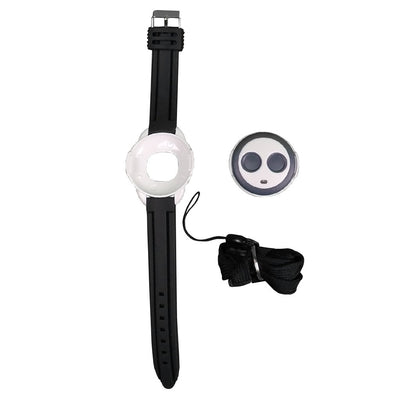
-
{"id":7037360069,"title":"Honeywell 5802WXT-2 Personal Panic Transmitter","handle":"honeywell-5802wxt-2-personal-panic-transmitter","description":"\u003ch2\u003eHoneywell 5802WXT-2 Personal Panic Transmitter\u003c\/h2\u003e\n\u003cp\u003eHoneywell 5802WXT-2 Personal Panic Transmitter is a great way to have piece of mind if you already have monitoring service where a panic signal would bring the authorities or in a non-monitored situation where it would set off a loud siren. This panic button features a double-button press feature for fewer false alarms.\u003c\/p\u003e\n\u003cp\u003eThis is great for the elderly with medical conditions or for those who want to put a little scare into an intruder. It can be set up in your panel's programming as a medical zone type or a burglary zone type depending upon what situation you need.\u003c\/p\u003e\n\u003cp\u003eThey also make accessories that can let you wear this as an armband, on your belt, or as a pendant you can hang around your neck.\u003c\/p\u003e\n\u003ch3\u003eSpecifications:\u003c\/h3\u003e\n\u003cp\u003eUnit Dimensions: 1.5\" (3.9mm) Diameter\u003cbr\u003eBattery: 3V 2032 Lithium\u003cbr\u003e\u003cbr\u003e\u003cstrong\u003eFeatures:\u003c\/strong\u003e\u003c\/p\u003e\n\u003cul\u003e\n\u003cli\u003eOption to be a fully supervised portable panic transmitter \u003c\/li\u003e\n\u003cli\u003eMulti-wear accessories :\u003c\/li\u003e\n\u003cul\u003e\n\u003cli\u003ePendant batteries \u003c\/li\u003e\n\u003cli\u003eWristband \u003c\/li\u003e\n\u003cli\u003eBelt clip \u003c\/li\u003e\n\u003cli\u003eKeychain \u003c\/li\u003e\n\u003c\/ul\u003e\n\u003cli\u003eWater resistant. Can be worn in the shower or bath \u003c\/li\u003e\n\u003cli\u003eTactile feel key(s) are recessed to deter false alarms \u003c\/li\u003e\n\u003cli\u003eLED indicates transmission was sent \u003c\/li\u003e\n\u003cli\u003eLong-life replaceable lithium batteries \u003c\/li\u003e\n\u003cli\u003eAvailable in: \u003c\/li\u003e\n\u003cul\u003e\n\u003cli\u003eOne-button: Press and hold two seconds for activation \u003c\/li\u003e\n\u003cli\u003eTwo-button: Press both buttons simultaneously and hold two seconds for activation\u003c\/li\u003e\n\u003c\/ul\u003e\n\u003cli\u003eCompatible with Honeywell's 5800 Series wireless system\u003c\/li\u003e\n\u003c\/ul\u003e\n\u003cp\u003e\u003ca href=\"https:\/\/cdn.shopify.com\/s\/files\/1\/1659\/9809\/files\/5802WXT-English-Installation-Instructions.PDF?17579607298099855443\" target=\"_blank\" title=\"5802WXT-2 Installation manual\" rel=\"noopener noreferrer\"\u003e5802WXT-2 Installation manual\u003cbr\u003e\u003c\/a\u003e\u003ca href=\"https:\/\/cdn.shopify.com\/s\/files\/1\/1659\/9809\/files\/5802WXT-Data-Sheet.PDF?17579607298099855443\" target=\"_blank\" title=\"5802WXT-2 Data sheet\" rel=\"noopener noreferrer\"\u003e5802WXT-2 Data sheet\u003c\/a\u003e\u003c\/p\u003e","published_at":"2016-10-20T03:57:00-04:00","created_at":"2017-01-23T07:16:51-05:00","vendor":"Honeywell","type":"Honeywell Security Wireless","tags":["Els PW 22614","Honeywell Security","Honeywell Security Wireless"],"price":6195,"price_min":6195,"price_max":6195,"available":true,"price_varies":false,"compare_at_price":null,"compare_at_price_min":0,"compare_at_price_max":0,"compare_at_price_varies":false,"variants":[{"id":24526474309,"title":"Default Title","option1":"Default Title","option2":null,"option3":null,"sku":"HON-5802WXT-2","requires_shipping":true,"taxable":true,"featured_image":null,"available":true,"name":"Honeywell 5802WXT-2 Personal Panic Transmitter","public_title":null,"options":["Default Title"],"price":6195,"weight":136,"compare_at_price":null,"inventory_quantity":0,"inventory_management":"shopify","inventory_policy":"continue","barcode":"HON-5802WXT-2","requires_selling_plan":false,"selling_plan_allocations":[]}],"images":["\/\/www.alarmsystemstore.com\/cdn\/shop\/products\/honeywell-5802wxt-2-personal-panic-transmitter-280904.jpg?v=1595526214","\/\/www.alarmsystemstore.com\/cdn\/shop\/products\/honeywell-5802wxt-2-personal-panic-transmitter-822247.jpg?v=1595526214"],"featured_image":"\/\/www.alarmsystemstore.com\/cdn\/shop\/products\/honeywell-5802wxt-2-personal-panic-transmitter-280904.jpg?v=1595526214","options":["Title"],"media":[{"alt":"Honeywell 5802WXT-2 Personal Panic Transmitter - AlarmSystemStore.com","id":7363150151782,"position":1,"preview_image":{"aspect_ratio":1.0,"height":1024,"width":1024,"src":"\/\/www.alarmsystemstore.com\/cdn\/shop\/products\/honeywell-5802wxt-2-personal-panic-transmitter-280904.jpg?v=1595526214"},"aspect_ratio":1.0,"height":1024,"media_type":"image","src":"\/\/www.alarmsystemstore.com\/cdn\/shop\/products\/honeywell-5802wxt-2-personal-panic-transmitter-280904.jpg?v=1595526214","width":1024},{"alt":"Honeywell 5802WXT-2 Personal Panic Transmitter - AlarmSystemStore.com","id":7363150184550,"position":2,"preview_image":{"aspect_ratio":1.0,"height":1024,"width":1024,"src":"\/\/www.alarmsystemstore.com\/cdn\/shop\/products\/honeywell-5802wxt-2-personal-panic-transmitter-822247.jpg?v=1595526214"},"aspect_ratio":1.0,"height":1024,"media_type":"image","src":"\/\/www.alarmsystemstore.com\/cdn\/shop\/products\/honeywell-5802wxt-2-personal-panic-transmitter-822247.jpg?v=1595526214","width":1024}],"requires_selling_plan":false,"selling_plan_groups":[],"content":"\u003ch2\u003eHoneywell 5802WXT-2 Personal Panic Transmitter\u003c\/h2\u003e\n\u003cp\u003eHoneywell 5802WXT-2 Personal Panic Transmitter is a great way to have piece of mind if you already have monitoring service where a panic signal would bring the authorities or in a non-monitored situation where it would set off a loud siren. This panic button features a double-button press feature for fewer false alarms.\u003c\/p\u003e\n\u003cp\u003eThis is great for the elderly with medical conditions or for those who want to put a little scare into an intruder. It can be set up in your panel's programming as a medical zone type or a burglary zone type depending upon what situation you need.\u003c\/p\u003e\n\u003cp\u003eThey also make accessories that can let you wear this as an armband, on your belt, or as a pendant you can hang around your neck.\u003c\/p\u003e\n\u003ch3\u003eSpecifications:\u003c\/h3\u003e\n\u003cp\u003eUnit Dimensions: 1.5\" (3.9mm) Diameter\u003cbr\u003eBattery: 3V 2032 Lithium\u003cbr\u003e\u003cbr\u003e\u003cstrong\u003eFeatures:\u003c\/strong\u003e\u003c\/p\u003e\n\u003cul\u003e\n\u003cli\u003eOption to be a fully supervised portable panic transmitter \u003c\/li\u003e\n\u003cli\u003eMulti-wear accessories :\u003c\/li\u003e\n\u003cul\u003e\n\u003cli\u003ePendant batteries \u003c\/li\u003e\n\u003cli\u003eWristband \u003c\/li\u003e\n\u003cli\u003eBelt clip \u003c\/li\u003e\n\u003cli\u003eKeychain \u003c\/li\u003e\n\u003c\/ul\u003e\n\u003cli\u003eWater resistant. Can be worn in the shower or bath \u003c\/li\u003e\n\u003cli\u003eTactile feel key(s) are recessed to deter false alarms \u003c\/li\u003e\n\u003cli\u003eLED indicates transmission was sent \u003c\/li\u003e\n\u003cli\u003eLong-life replaceable lithium batteries \u003c\/li\u003e\n\u003cli\u003eAvailable in: \u003c\/li\u003e\n\u003cul\u003e\n\u003cli\u003eOne-button: Press and hold two seconds for activation \u003c\/li\u003e\n\u003cli\u003eTwo-button: Press both buttons simultaneously and hold two seconds for activation\u003c\/li\u003e\n\u003c\/ul\u003e\n\u003cli\u003eCompatible with Honeywell's 5800 Series wireless system\u003c\/li\u003e\n\u003c\/ul\u003e\n\u003cp\u003e\u003ca href=\"https:\/\/cdn.shopify.com\/s\/files\/1\/1659\/9809\/files\/5802WXT-English-Installation-Instructions.PDF?17579607298099855443\" target=\"_blank\" title=\"5802WXT-2 Installation manual\" rel=\"noopener noreferrer\"\u003e5802WXT-2 Installation manual\u003cbr\u003e\u003c\/a\u003e\u003ca href=\"https:\/\/cdn.shopify.com\/s\/files\/1\/1659\/9809\/files\/5802WXT-Data-Sheet.PDF?17579607298099855443\" target=\"_blank\" title=\"5802WXT-2 Data sheet\" rel=\"noopener noreferrer\"\u003e5802WXT-2 Data sheet\u003c\/a\u003e\u003c\/p\u003e"}
-
{"id":7037360069,"title":"Honeywell 5802WXT-2 Personal Panic Transmitter","handle":"honeywell-5802wxt-2-personal-panic-transmitter","description":"\u003ch2\u003eHoneywell 5802WXT-2 Personal Panic Transmitter\u003c\/h2\u003e\n\u003cp\u003eHoneywell 5802WXT-2 Personal Panic Transmitter is a great way to have piece of mind if you already have monitoring service where a panic signal would bring the authorities or in a non-monitored situation where it would set off a loud siren. This panic button features a double-button press feature for fewer false alarms.\u003c\/p\u003e\n\u003cp\u003eThis is great for the elderly with medical conditions or for those who want to put a little scare into an intruder. It can be set up in your panel's programming as a medical zone type or a burglary zone type depending upon what situation you need.\u003c\/p\u003e\n\u003cp\u003eThey also make accessories that can let you wear this as an armband, on your belt, or as a pendant you can hang around your neck.\u003c\/p\u003e\n\u003ch3\u003eSpecifications:\u003c\/h3\u003e\n\u003cp\u003eUnit Dimensions: 1.5\" (3.9mm) Diameter\u003cbr\u003eBattery: 3V 2032 Lithium\u003cbr\u003e\u003cbr\u003e\u003cstrong\u003eFeatures:\u003c\/strong\u003e\u003c\/p\u003e\n\u003cul\u003e\n\u003cli\u003eOption to be a fully supervised portable panic transmitter \u003c\/li\u003e\n\u003cli\u003eMulti-wear accessories :\u003c\/li\u003e\n\u003cul\u003e\n\u003cli\u003ePendant batteries \u003c\/li\u003e\n\u003cli\u003eWristband \u003c\/li\u003e\n\u003cli\u003eBelt clip \u003c\/li\u003e\n\u003cli\u003eKeychain \u003c\/li\u003e\n\u003c\/ul\u003e\n\u003cli\u003eWater resistant. Can be worn in the shower or bath \u003c\/li\u003e\n\u003cli\u003eTactile feel key(s) are recessed to deter false alarms \u003c\/li\u003e\n\u003cli\u003eLED indicates transmission was sent \u003c\/li\u003e\n\u003cli\u003eLong-life replaceable lithium batteries \u003c\/li\u003e\n\u003cli\u003eAvailable in: \u003c\/li\u003e\n\u003cul\u003e\n\u003cli\u003eOne-button: Press and hold two seconds for activation \u003c\/li\u003e\n\u003cli\u003eTwo-button: Press both buttons simultaneously and hold two seconds for activation\u003c\/li\u003e\n\u003c\/ul\u003e\n\u003cli\u003eCompatible with Honeywell's 5800 Series wireless system\u003c\/li\u003e\n\u003c\/ul\u003e\n\u003cp\u003e\u003ca href=\"https:\/\/cdn.shopify.com\/s\/files\/1\/1659\/9809\/files\/5802WXT-English-Installation-Instructions.PDF?17579607298099855443\" target=\"_blank\" title=\"5802WXT-2 Installation manual\" rel=\"noopener noreferrer\"\u003e5802WXT-2 Installation manual\u003cbr\u003e\u003c\/a\u003e\u003ca href=\"https:\/\/cdn.shopify.com\/s\/files\/1\/1659\/9809\/files\/5802WXT-Data-Sheet.PDF?17579607298099855443\" target=\"_blank\" title=\"5802WXT-2 Data sheet\" rel=\"noopener noreferrer\"\u003e5802WXT-2 Data sheet\u003c\/a\u003e\u003c\/p\u003e","published_at":"2016-10-20T03:57:00-04:00","created_at":"2017-01-23T07:16:51-05:00","vendor":"Honeywell","type":"Honeywell Security Wireless","tags":["Els PW 22614","Honeywell Security","Honeywell Security Wireless"],"price":6195,"price_min":6195,"price_max":6195,"available":true,"price_varies":false,"compare_at_price":null,"compare_at_price_min":0,"compare_at_price_max":0,"compare_at_price_varies":false,"variants":[{"id":24526474309,"title":"Default Title","option1":"Default Title","option2":null,"option3":null,"sku":"HON-5802WXT-2","requires_shipping":true,"taxable":true,"featured_image":null,"available":true,"name":"Honeywell 5802WXT-2 Personal Panic Transmitter","public_title":null,"options":["Default Title"],"price":6195,"weight":136,"compare_at_price":null,"inventory_quantity":0,"inventory_management":"shopify","inventory_policy":"continue","barcode":"HON-5802WXT-2","requires_selling_plan":false,"selling_plan_allocations":[]}],"images":["\/\/www.alarmsystemstore.com\/cdn\/shop\/products\/honeywell-5802wxt-2-personal-panic-transmitter-280904.jpg?v=1595526214","\/\/www.alarmsystemstore.com\/cdn\/shop\/products\/honeywell-5802wxt-2-personal-panic-transmitter-822247.jpg?v=1595526214"],"featured_image":"\/\/www.alarmsystemstore.com\/cdn\/shop\/products\/honeywell-5802wxt-2-personal-panic-transmitter-280904.jpg?v=1595526214","options":["Title"],"media":[{"alt":"Honeywell 5802WXT-2 Personal Panic Transmitter - AlarmSystemStore.com","id":7363150151782,"position":1,"preview_image":{"aspect_ratio":1.0,"height":1024,"width":1024,"src":"\/\/www.alarmsystemstore.com\/cdn\/shop\/products\/honeywell-5802wxt-2-personal-panic-transmitter-280904.jpg?v=1595526214"},"aspect_ratio":1.0,"height":1024,"media_type":"image","src":"\/\/www.alarmsystemstore.com\/cdn\/shop\/products\/honeywell-5802wxt-2-personal-panic-transmitter-280904.jpg?v=1595526214","width":1024},{"alt":"Honeywell 5802WXT-2 Personal Panic Transmitter - AlarmSystemStore.com","id":7363150184550,"position":2,"preview_image":{"aspect_ratio":1.0,"height":1024,"width":1024,"src":"\/\/www.alarmsystemstore.com\/cdn\/shop\/products\/honeywell-5802wxt-2-personal-panic-transmitter-822247.jpg?v=1595526214"},"aspect_ratio":1.0,"height":1024,"media_type":"image","src":"\/\/www.alarmsystemstore.com\/cdn\/shop\/products\/honeywell-5802wxt-2-personal-panic-transmitter-822247.jpg?v=1595526214","width":1024}],"requires_selling_plan":false,"selling_plan_groups":[],"content":"\u003ch2\u003eHoneywell 5802WXT-2 Personal Panic Transmitter\u003c\/h2\u003e\n\u003cp\u003eHoneywell 5802WXT-2 Personal Panic Transmitter is a great way to have piece of mind if you already have monitoring service where a panic signal would bring the authorities or in a non-monitored situation where it would set off a loud siren. This panic button features a double-button press feature for fewer false alarms.\u003c\/p\u003e\n\u003cp\u003eThis is great for the elderly with medical conditions or for those who want to put a little scare into an intruder. It can be set up in your panel's programming as a medical zone type or a burglary zone type depending upon what situation you need.\u003c\/p\u003e\n\u003cp\u003eThey also make accessories that can let you wear this as an armband, on your belt, or as a pendant you can hang around your neck.\u003c\/p\u003e\n\u003ch3\u003eSpecifications:\u003c\/h3\u003e\n\u003cp\u003eUnit Dimensions: 1.5\" (3.9mm) Diameter\u003cbr\u003eBattery: 3V 2032 Lithium\u003cbr\u003e\u003cbr\u003e\u003cstrong\u003eFeatures:\u003c\/strong\u003e\u003c\/p\u003e\n\u003cul\u003e\n\u003cli\u003eOption to be a fully supervised portable panic transmitter \u003c\/li\u003e\n\u003cli\u003eMulti-wear accessories :\u003c\/li\u003e\n\u003cul\u003e\n\u003cli\u003ePendant batteries \u003c\/li\u003e\n\u003cli\u003eWristband \u003c\/li\u003e\n\u003cli\u003eBelt clip \u003c\/li\u003e\n\u003cli\u003eKeychain \u003c\/li\u003e\n\u003c\/ul\u003e\n\u003cli\u003eWater resistant. Can be worn in the shower or bath \u003c\/li\u003e\n\u003cli\u003eTactile feel key(s) are recessed to deter false alarms \u003c\/li\u003e\n\u003cli\u003eLED indicates transmission was sent \u003c\/li\u003e\n\u003cli\u003eLong-life replaceable lithium batteries \u003c\/li\u003e\n\u003cli\u003eAvailable in: \u003c\/li\u003e\n\u003cul\u003e\n\u003cli\u003eOne-button: Press and hold two seconds for activation \u003c\/li\u003e\n\u003cli\u003eTwo-button: Press both buttons simultaneously and hold two seconds for activation\u003c\/li\u003e\n\u003c\/ul\u003e\n\u003cli\u003eCompatible with Honeywell's 5800 Series wireless system\u003c\/li\u003e\n\u003c\/ul\u003e\n\u003cp\u003e\u003ca href=\"https:\/\/cdn.shopify.com\/s\/files\/1\/1659\/9809\/files\/5802WXT-English-Installation-Instructions.PDF?17579607298099855443\" target=\"_blank\" title=\"5802WXT-2 Installation manual\" rel=\"noopener noreferrer\"\u003e5802WXT-2 Installation manual\u003cbr\u003e\u003c\/a\u003e\u003ca href=\"https:\/\/cdn.shopify.com\/s\/files\/1\/1659\/9809\/files\/5802WXT-Data-Sheet.PDF?17579607298099855443\" target=\"_blank\" title=\"5802WXT-2 Data sheet\" rel=\"noopener noreferrer\"\u003e5802WXT-2 Data sheet\u003c\/a\u003e\u003c\/p\u003e"}
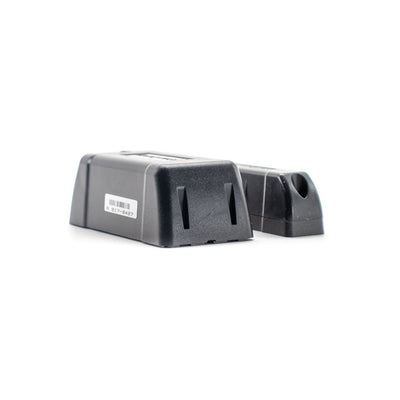
-
{"id":7037360197,"title":"Honeywell 5816OD Wireless Outdoor Transmitter With Magnet","handle":"honeywell-5816od-wireless-outdoor-transmitter","description":"\u003ch2\u003eHoneywell 5816OD Wireless Outdoor Transmitter With Magnet\u003c\/h2\u003e\n\u003cbr\u003eThe Honeywell 5816OD is here!! This wireless transmitter was specially made for use in the outdoors and extreme temperatures. It operates in temperatures from -40˚ F to 150˚ F (-40˚ C to +66˚ C). Just as the \u003ca title=\"Honeywell 5816WMWH\" target=\"_self\" href=\"https:\/\/www.alarmsystemstore.com\/products\/honeywell-5816wmwh-wireless-transmitter-with-magnet\"\u003e5816WMWH\u003c\/a\u003e; the 5816OD has two loops. One loop is for using the included magnet for applications that involve doors, gates, sheds, etc. The other loop is a hardwired contact loop. You can wire a NC two-wire type device into the internal terminals contained in the 5816OD's housing. This wireless sensor is compatible with the Honeywell Vista 15P, Vista 20P and all Lynx Series.\u003cbr\u003e\u003cbr\u003e\u003cstrong\u003eFeatures:\u003c\/strong\u003e\u003cbr\u003e\n\u003cul\u003e\n\u003cli\u003eWeather-proof and water-resistant housing makes it ideal for harsh outdoor climates -40? F to 150? F (-40? C to +66? C), (100% RH) \u003c\/li\u003e\n\u003cli\u003eMaximum magnet gap 1.75\" on wood, vinyl and non-metallic surfaces and 1.25\" on steel to facilitate easier installation \u003c\/li\u003e\n\u003cli\u003eTwo long life AA lithium batteries, easily replaceable \u003c\/li\u003e\n\u003cli\u003eBuilt-in reed switch contact loop \u003c\/li\u003e\n\u003cli\u003eBuilt-in wired closed contact loop (for use with external devices) \u003c\/li\u003e\n\u003cli\u003eTamper protection-removal of front cover and transmitter from mounting plate \u003c\/li\u003e\n\u003cli\u003eScrew mountable \u003c\/li\u003e\n\u003cli\u003eStainless steel or nylon cable tie mountable (ties not included) \u003c\/li\u003e\n\u003cli\u003eMagnet and magnet spacer included \u003c\/li\u003e\n\u003cli\u003ePaintable plastic housing to match any surface\u003c\/li\u003e\n\u003c\/ul\u003e\n\u003cp\u003e\u003ca href=\"https:\/\/cdn.shopify.com\/s\/files\/1\/1659\/9809\/files\/5816OD-Quick-Installation-Guide.PDF?11388064000501058213\" target=\"_blank\" title=\"5816OD Installation manual\" rel=\"noopener noreferrer\"\u003e5816OD Installation manual\u003cbr\u003e\u003c\/a\u003e\u003ca href=\"https:\/\/cdn.shopify.com\/s\/files\/1\/1659\/9809\/files\/5816OD-FAQ-sheet.PDF?11388064000501058213\" target=\"_blank\" title=\"5816OD FAQ\" rel=\"noopener noreferrer\"\u003e5816OD FAQ\u003cbr\u003e\u003c\/a\u003e\u003ca href=\"https:\/\/cdn.shopify.com\/s\/files\/1\/1659\/9809\/files\/5816OD-Data-Sheet.PDF?11388064000501058213\" target=\"_blank\" title=\"5816OD Data sheet\" rel=\"noopener noreferrer\"\u003e5816OD Data sheet\u003c\/a\u003e\u003c\/p\u003e","published_at":"2016-10-20T03:57:00-04:00","created_at":"2017-01-23T07:16:52-05:00","vendor":"Honeywell","type":"Honeywell Security Wireless","tags":["Els PW 22614","Honeywell Security","Honeywell Security Wireless"],"price":10995,"price_min":10995,"price_max":10995,"available":true,"price_varies":false,"compare_at_price":null,"compare_at_price_min":0,"compare_at_price_max":0,"compare_at_price_varies":false,"variants":[{"id":24526474501,"title":"Default Title","option1":"Default Title","option2":null,"option3":null,"sku":"HON-5816OD","requires_shipping":true,"taxable":true,"featured_image":null,"available":true,"name":"Honeywell 5816OD Wireless Outdoor Transmitter With Magnet","public_title":null,"options":["Default Title"],"price":10995,"weight":907,"compare_at_price":null,"inventory_quantity":0,"inventory_management":"shopify","inventory_policy":"continue","barcode":"HON-5816OD","requires_selling_plan":false,"selling_plan_allocations":[]}],"images":["\/\/www.alarmsystemstore.com\/cdn\/shop\/products\/honeywell-5816od-wireless-outdoor-transmitter-with-magnet-822640.jpg?v=1595526212","\/\/www.alarmsystemstore.com\/cdn\/shop\/products\/honeywell-5816od-wireless-outdoor-transmitter-with-magnet-946844.jpg?v=1595526212","\/\/www.alarmsystemstore.com\/cdn\/shop\/products\/honeywell-5816od-wireless-outdoor-transmitter-with-magnet-515143.jpg?v=1595526212","\/\/www.alarmsystemstore.com\/cdn\/shop\/products\/honeywell-5816od-wireless-outdoor-transmitter-with-magnet-333272.jpg?v=1595526212","\/\/www.alarmsystemstore.com\/cdn\/shop\/products\/honeywell-5816od-wireless-outdoor-transmitter-with-magnet-459210.jpg?v=1595526212"],"featured_image":"\/\/www.alarmsystemstore.com\/cdn\/shop\/products\/honeywell-5816od-wireless-outdoor-transmitter-with-magnet-822640.jpg?v=1595526212","options":["Title"],"media":[{"alt":"Honeywell 5816OD Wireless Outdoor Transmitter With Magnet - AlarmSystemStore.com","id":7363149365350,"position":1,"preview_image":{"aspect_ratio":1.0,"height":1024,"width":1024,"src":"\/\/www.alarmsystemstore.com\/cdn\/shop\/products\/honeywell-5816od-wireless-outdoor-transmitter-with-magnet-822640.jpg?v=1595526212"},"aspect_ratio":1.0,"height":1024,"media_type":"image","src":"\/\/www.alarmsystemstore.com\/cdn\/shop\/products\/honeywell-5816od-wireless-outdoor-transmitter-with-magnet-822640.jpg?v=1595526212","width":1024},{"alt":"Honeywell 5816OD Wireless Outdoor Transmitter With Magnet - AlarmSystemStore.com","id":7363149398118,"position":2,"preview_image":{"aspect_ratio":1.0,"height":1024,"width":1024,"src":"\/\/www.alarmsystemstore.com\/cdn\/shop\/products\/honeywell-5816od-wireless-outdoor-transmitter-with-magnet-946844.jpg?v=1595526212"},"aspect_ratio":1.0,"height":1024,"media_type":"image","src":"\/\/www.alarmsystemstore.com\/cdn\/shop\/products\/honeywell-5816od-wireless-outdoor-transmitter-with-magnet-946844.jpg?v=1595526212","width":1024},{"alt":"Honeywell 5816OD Wireless Outdoor Transmitter With Magnet - AlarmSystemStore.com","id":7363149463654,"position":3,"preview_image":{"aspect_ratio":1.0,"height":1024,"width":1024,"src":"\/\/www.alarmsystemstore.com\/cdn\/shop\/products\/honeywell-5816od-wireless-outdoor-transmitter-with-magnet-515143.jpg?v=1595526212"},"aspect_ratio":1.0,"height":1024,"media_type":"image","src":"\/\/www.alarmsystemstore.com\/cdn\/shop\/products\/honeywell-5816od-wireless-outdoor-transmitter-with-magnet-515143.jpg?v=1595526212","width":1024},{"alt":"Honeywell 5816OD Wireless Outdoor Transmitter With Magnet - AlarmSystemStore.com","id":7363149529190,"position":4,"preview_image":{"aspect_ratio":1.0,"height":1024,"width":1024,"src":"\/\/www.alarmsystemstore.com\/cdn\/shop\/products\/honeywell-5816od-wireless-outdoor-transmitter-with-magnet-333272.jpg?v=1595526212"},"aspect_ratio":1.0,"height":1024,"media_type":"image","src":"\/\/www.alarmsystemstore.com\/cdn\/shop\/products\/honeywell-5816od-wireless-outdoor-transmitter-with-magnet-333272.jpg?v=1595526212","width":1024},{"alt":"Honeywell 5816OD Wireless Outdoor Transmitter With Magnet - AlarmSystemStore.com","id":7363149561958,"position":5,"preview_image":{"aspect_ratio":1.0,"height":1024,"width":1024,"src":"\/\/www.alarmsystemstore.com\/cdn\/shop\/products\/honeywell-5816od-wireless-outdoor-transmitter-with-magnet-459210.jpg?v=1595526212"},"aspect_ratio":1.0,"height":1024,"media_type":"image","src":"\/\/www.alarmsystemstore.com\/cdn\/shop\/products\/honeywell-5816od-wireless-outdoor-transmitter-with-magnet-459210.jpg?v=1595526212","width":1024}],"requires_selling_plan":false,"selling_plan_groups":[],"content":"\u003ch2\u003eHoneywell 5816OD Wireless Outdoor Transmitter With Magnet\u003c\/h2\u003e\n\u003cbr\u003eThe Honeywell 5816OD is here!! This wireless transmitter was specially made for use in the outdoors and extreme temperatures. It operates in temperatures from -40˚ F to 150˚ F (-40˚ C to +66˚ C). Just as the \u003ca title=\"Honeywell 5816WMWH\" target=\"_self\" href=\"https:\/\/www.alarmsystemstore.com\/products\/honeywell-5816wmwh-wireless-transmitter-with-magnet\"\u003e5816WMWH\u003c\/a\u003e; the 5816OD has two loops. One loop is for using the included magnet for applications that involve doors, gates, sheds, etc. The other loop is a hardwired contact loop. You can wire a NC two-wire type device into the internal terminals contained in the 5816OD's housing. This wireless sensor is compatible with the Honeywell Vista 15P, Vista 20P and all Lynx Series.\u003cbr\u003e\u003cbr\u003e\u003cstrong\u003eFeatures:\u003c\/strong\u003e\u003cbr\u003e\n\u003cul\u003e\n\u003cli\u003eWeather-proof and water-resistant housing makes it ideal for harsh outdoor climates -40? F to 150? F (-40? C to +66? C), (100% RH) \u003c\/li\u003e\n\u003cli\u003eMaximum magnet gap 1.75\" on wood, vinyl and non-metallic surfaces and 1.25\" on steel to facilitate easier installation \u003c\/li\u003e\n\u003cli\u003eTwo long life AA lithium batteries, easily replaceable \u003c\/li\u003e\n\u003cli\u003eBuilt-in reed switch contact loop \u003c\/li\u003e\n\u003cli\u003eBuilt-in wired closed contact loop (for use with external devices) \u003c\/li\u003e\n\u003cli\u003eTamper protection-removal of front cover and transmitter from mounting plate \u003c\/li\u003e\n\u003cli\u003eScrew mountable \u003c\/li\u003e\n\u003cli\u003eStainless steel or nylon cable tie mountable (ties not included) \u003c\/li\u003e\n\u003cli\u003eMagnet and magnet spacer included \u003c\/li\u003e\n\u003cli\u003ePaintable plastic housing to match any surface\u003c\/li\u003e\n\u003c\/ul\u003e\n\u003cp\u003e\u003ca href=\"https:\/\/cdn.shopify.com\/s\/files\/1\/1659\/9809\/files\/5816OD-Quick-Installation-Guide.PDF?11388064000501058213\" target=\"_blank\" title=\"5816OD Installation manual\" rel=\"noopener noreferrer\"\u003e5816OD Installation manual\u003cbr\u003e\u003c\/a\u003e\u003ca href=\"https:\/\/cdn.shopify.com\/s\/files\/1\/1659\/9809\/files\/5816OD-FAQ-sheet.PDF?11388064000501058213\" target=\"_blank\" title=\"5816OD FAQ\" rel=\"noopener noreferrer\"\u003e5816OD FAQ\u003cbr\u003e\u003c\/a\u003e\u003ca href=\"https:\/\/cdn.shopify.com\/s\/files\/1\/1659\/9809\/files\/5816OD-Data-Sheet.PDF?11388064000501058213\" target=\"_blank\" title=\"5816OD Data sheet\" rel=\"noopener noreferrer\"\u003e5816OD Data sheet\u003c\/a\u003e\u003c\/p\u003e"}
-
{"id":7037360197,"title":"Honeywell 5816OD Wireless Outdoor Transmitter With Magnet","handle":"honeywell-5816od-wireless-outdoor-transmitter","description":"\u003ch2\u003eHoneywell 5816OD Wireless Outdoor Transmitter With Magnet\u003c\/h2\u003e\n\u003cbr\u003eThe Honeywell 5816OD is here!! This wireless transmitter was specially made for use in the outdoors and extreme temperatures. It operates in temperatures from -40˚ F to 150˚ F (-40˚ C to +66˚ C). Just as the \u003ca title=\"Honeywell 5816WMWH\" target=\"_self\" href=\"https:\/\/www.alarmsystemstore.com\/products\/honeywell-5816wmwh-wireless-transmitter-with-magnet\"\u003e5816WMWH\u003c\/a\u003e; the 5816OD has two loops. One loop is for using the included magnet for applications that involve doors, gates, sheds, etc. The other loop is a hardwired contact loop. You can wire a NC two-wire type device into the internal terminals contained in the 5816OD's housing. This wireless sensor is compatible with the Honeywell Vista 15P, Vista 20P and all Lynx Series.\u003cbr\u003e\u003cbr\u003e\u003cstrong\u003eFeatures:\u003c\/strong\u003e\u003cbr\u003e\n\u003cul\u003e\n\u003cli\u003eWeather-proof and water-resistant housing makes it ideal for harsh outdoor climates -40? F to 150? F (-40? C to +66? C), (100% RH) \u003c\/li\u003e\n\u003cli\u003eMaximum magnet gap 1.75\" on wood, vinyl and non-metallic surfaces and 1.25\" on steel to facilitate easier installation \u003c\/li\u003e\n\u003cli\u003eTwo long life AA lithium batteries, easily replaceable \u003c\/li\u003e\n\u003cli\u003eBuilt-in reed switch contact loop \u003c\/li\u003e\n\u003cli\u003eBuilt-in wired closed contact loop (for use with external devices) \u003c\/li\u003e\n\u003cli\u003eTamper protection-removal of front cover and transmitter from mounting plate \u003c\/li\u003e\n\u003cli\u003eScrew mountable \u003c\/li\u003e\n\u003cli\u003eStainless steel or nylon cable tie mountable (ties not included) \u003c\/li\u003e\n\u003cli\u003eMagnet and magnet spacer included \u003c\/li\u003e\n\u003cli\u003ePaintable plastic housing to match any surface\u003c\/li\u003e\n\u003c\/ul\u003e\n\u003cp\u003e\u003ca href=\"https:\/\/cdn.shopify.com\/s\/files\/1\/1659\/9809\/files\/5816OD-Quick-Installation-Guide.PDF?11388064000501058213\" target=\"_blank\" title=\"5816OD Installation manual\" rel=\"noopener noreferrer\"\u003e5816OD Installation manual\u003cbr\u003e\u003c\/a\u003e\u003ca href=\"https:\/\/cdn.shopify.com\/s\/files\/1\/1659\/9809\/files\/5816OD-FAQ-sheet.PDF?11388064000501058213\" target=\"_blank\" title=\"5816OD FAQ\" rel=\"noopener noreferrer\"\u003e5816OD FAQ\u003cbr\u003e\u003c\/a\u003e\u003ca href=\"https:\/\/cdn.shopify.com\/s\/files\/1\/1659\/9809\/files\/5816OD-Data-Sheet.PDF?11388064000501058213\" target=\"_blank\" title=\"5816OD Data sheet\" rel=\"noopener noreferrer\"\u003e5816OD Data sheet\u003c\/a\u003e\u003c\/p\u003e","published_at":"2016-10-20T03:57:00-04:00","created_at":"2017-01-23T07:16:52-05:00","vendor":"Honeywell","type":"Honeywell Security Wireless","tags":["Els PW 22614","Honeywell Security","Honeywell Security Wireless"],"price":10995,"price_min":10995,"price_max":10995,"available":true,"price_varies":false,"compare_at_price":null,"compare_at_price_min":0,"compare_at_price_max":0,"compare_at_price_varies":false,"variants":[{"id":24526474501,"title":"Default Title","option1":"Default Title","option2":null,"option3":null,"sku":"HON-5816OD","requires_shipping":true,"taxable":true,"featured_image":null,"available":true,"name":"Honeywell 5816OD Wireless Outdoor Transmitter With Magnet","public_title":null,"options":["Default Title"],"price":10995,"weight":907,"compare_at_price":null,"inventory_quantity":0,"inventory_management":"shopify","inventory_policy":"continue","barcode":"HON-5816OD","requires_selling_plan":false,"selling_plan_allocations":[]}],"images":["\/\/www.alarmsystemstore.com\/cdn\/shop\/products\/honeywell-5816od-wireless-outdoor-transmitter-with-magnet-822640.jpg?v=1595526212","\/\/www.alarmsystemstore.com\/cdn\/shop\/products\/honeywell-5816od-wireless-outdoor-transmitter-with-magnet-946844.jpg?v=1595526212","\/\/www.alarmsystemstore.com\/cdn\/shop\/products\/honeywell-5816od-wireless-outdoor-transmitter-with-magnet-515143.jpg?v=1595526212","\/\/www.alarmsystemstore.com\/cdn\/shop\/products\/honeywell-5816od-wireless-outdoor-transmitter-with-magnet-333272.jpg?v=1595526212","\/\/www.alarmsystemstore.com\/cdn\/shop\/products\/honeywell-5816od-wireless-outdoor-transmitter-with-magnet-459210.jpg?v=1595526212"],"featured_image":"\/\/www.alarmsystemstore.com\/cdn\/shop\/products\/honeywell-5816od-wireless-outdoor-transmitter-with-magnet-822640.jpg?v=1595526212","options":["Title"],"media":[{"alt":"Honeywell 5816OD Wireless Outdoor Transmitter With Magnet - AlarmSystemStore.com","id":7363149365350,"position":1,"preview_image":{"aspect_ratio":1.0,"height":1024,"width":1024,"src":"\/\/www.alarmsystemstore.com\/cdn\/shop\/products\/honeywell-5816od-wireless-outdoor-transmitter-with-magnet-822640.jpg?v=1595526212"},"aspect_ratio":1.0,"height":1024,"media_type":"image","src":"\/\/www.alarmsystemstore.com\/cdn\/shop\/products\/honeywell-5816od-wireless-outdoor-transmitter-with-magnet-822640.jpg?v=1595526212","width":1024},{"alt":"Honeywell 5816OD Wireless Outdoor Transmitter With Magnet - AlarmSystemStore.com","id":7363149398118,"position":2,"preview_image":{"aspect_ratio":1.0,"height":1024,"width":1024,"src":"\/\/www.alarmsystemstore.com\/cdn\/shop\/products\/honeywell-5816od-wireless-outdoor-transmitter-with-magnet-946844.jpg?v=1595526212"},"aspect_ratio":1.0,"height":1024,"media_type":"image","src":"\/\/www.alarmsystemstore.com\/cdn\/shop\/products\/honeywell-5816od-wireless-outdoor-transmitter-with-magnet-946844.jpg?v=1595526212","width":1024},{"alt":"Honeywell 5816OD Wireless Outdoor Transmitter With Magnet - AlarmSystemStore.com","id":7363149463654,"position":3,"preview_image":{"aspect_ratio":1.0,"height":1024,"width":1024,"src":"\/\/www.alarmsystemstore.com\/cdn\/shop\/products\/honeywell-5816od-wireless-outdoor-transmitter-with-magnet-515143.jpg?v=1595526212"},"aspect_ratio":1.0,"height":1024,"media_type":"image","src":"\/\/www.alarmsystemstore.com\/cdn\/shop\/products\/honeywell-5816od-wireless-outdoor-transmitter-with-magnet-515143.jpg?v=1595526212","width":1024},{"alt":"Honeywell 5816OD Wireless Outdoor Transmitter With Magnet - AlarmSystemStore.com","id":7363149529190,"position":4,"preview_image":{"aspect_ratio":1.0,"height":1024,"width":1024,"src":"\/\/www.alarmsystemstore.com\/cdn\/shop\/products\/honeywell-5816od-wireless-outdoor-transmitter-with-magnet-333272.jpg?v=1595526212"},"aspect_ratio":1.0,"height":1024,"media_type":"image","src":"\/\/www.alarmsystemstore.com\/cdn\/shop\/products\/honeywell-5816od-wireless-outdoor-transmitter-with-magnet-333272.jpg?v=1595526212","width":1024},{"alt":"Honeywell 5816OD Wireless Outdoor Transmitter With Magnet - AlarmSystemStore.com","id":7363149561958,"position":5,"preview_image":{"aspect_ratio":1.0,"height":1024,"width":1024,"src":"\/\/www.alarmsystemstore.com\/cdn\/shop\/products\/honeywell-5816od-wireless-outdoor-transmitter-with-magnet-459210.jpg?v=1595526212"},"aspect_ratio":1.0,"height":1024,"media_type":"image","src":"\/\/www.alarmsystemstore.com\/cdn\/shop\/products\/honeywell-5816od-wireless-outdoor-transmitter-with-magnet-459210.jpg?v=1595526212","width":1024}],"requires_selling_plan":false,"selling_plan_groups":[],"content":"\u003ch2\u003eHoneywell 5816OD Wireless Outdoor Transmitter With Magnet\u003c\/h2\u003e\n\u003cbr\u003eThe Honeywell 5816OD is here!! This wireless transmitter was specially made for use in the outdoors and extreme temperatures. It operates in temperatures from -40˚ F to 150˚ F (-40˚ C to +66˚ C). Just as the \u003ca title=\"Honeywell 5816WMWH\" target=\"_self\" href=\"https:\/\/www.alarmsystemstore.com\/products\/honeywell-5816wmwh-wireless-transmitter-with-magnet\"\u003e5816WMWH\u003c\/a\u003e; the 5816OD has two loops. One loop is for using the included magnet for applications that involve doors, gates, sheds, etc. The other loop is a hardwired contact loop. You can wire a NC two-wire type device into the internal terminals contained in the 5816OD's housing. This wireless sensor is compatible with the Honeywell Vista 15P, Vista 20P and all Lynx Series.\u003cbr\u003e\u003cbr\u003e\u003cstrong\u003eFeatures:\u003c\/strong\u003e\u003cbr\u003e\n\u003cul\u003e\n\u003cli\u003eWeather-proof and water-resistant housing makes it ideal for harsh outdoor climates -40? F to 150? F (-40? C to +66? C), (100% RH) \u003c\/li\u003e\n\u003cli\u003eMaximum magnet gap 1.75\" on wood, vinyl and non-metallic surfaces and 1.25\" on steel to facilitate easier installation \u003c\/li\u003e\n\u003cli\u003eTwo long life AA lithium batteries, easily replaceable \u003c\/li\u003e\n\u003cli\u003eBuilt-in reed switch contact loop \u003c\/li\u003e\n\u003cli\u003eBuilt-in wired closed contact loop (for use with external devices) \u003c\/li\u003e\n\u003cli\u003eTamper protection-removal of front cover and transmitter from mounting plate \u003c\/li\u003e\n\u003cli\u003eScrew mountable \u003c\/li\u003e\n\u003cli\u003eStainless steel or nylon cable tie mountable (ties not included) \u003c\/li\u003e\n\u003cli\u003eMagnet and magnet spacer included \u003c\/li\u003e\n\u003cli\u003ePaintable plastic housing to match any surface\u003c\/li\u003e\n\u003c\/ul\u003e\n\u003cp\u003e\u003ca href=\"https:\/\/cdn.shopify.com\/s\/files\/1\/1659\/9809\/files\/5816OD-Quick-Installation-Guide.PDF?11388064000501058213\" target=\"_blank\" title=\"5816OD Installation manual\" rel=\"noopener noreferrer\"\u003e5816OD Installation manual\u003cbr\u003e\u003c\/a\u003e\u003ca href=\"https:\/\/cdn.shopify.com\/s\/files\/1\/1659\/9809\/files\/5816OD-FAQ-sheet.PDF?11388064000501058213\" target=\"_blank\" title=\"5816OD FAQ\" rel=\"noopener noreferrer\"\u003e5816OD FAQ\u003cbr\u003e\u003c\/a\u003e\u003ca href=\"https:\/\/cdn.shopify.com\/s\/files\/1\/1659\/9809\/files\/5816OD-Data-Sheet.PDF?11388064000501058213\" target=\"_blank\" title=\"5816OD Data sheet\" rel=\"noopener noreferrer\"\u003e5816OD Data sheet\u003c\/a\u003e\u003c\/p\u003e"}
